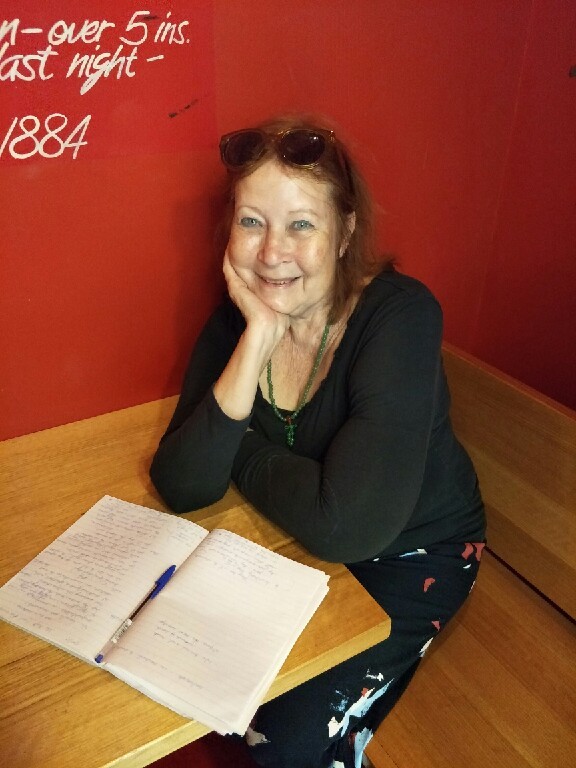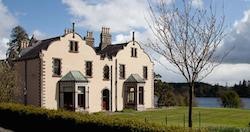
Image courtesy of Christina Ealing-Godbold
A regular client of the State Library of Queensland, Jena Woodhouse, is a prolific Queensland poet and writer who works frequently in our reading rooms. Born and raised near the Capricorn coast, Jena graduated from the University of Queensland having studied Russian Language and Literature and also education. Jena has traveled extensively. Her passion for Greece and its lifestyle led her to live and work there, as a language teacher and arts journalist for more than a decade. Jena is a lover of libraries and the printed word and has worked as a literary editor, is a trained librarian, and has been published in many literary journals. As author, compiler and translator of seven book publications, one of which won a national award, Jena reads widely and can often tell staff what is in our collections. Jena acknowledges that State Library of Queensland is one of the most compelling reasons for her return to Queensland after living overseas, as she felt that she must be able to have access to an excellent library on a daily basis.
State Library of Queensland has a range of literature databases and resources, including the the Australian literature database, Austlit, which features more information about the work of Jena Woodhouse. Austlit is available via the State Library One Search catalogue and includes detailed lists of the works and biographical details of Australian Authors.
Recently, Jena was missing from our library for a period of time while she undertook a residency at Tyrone Guthrie Centre at Annaghmakerrig, a haven for artists and writers in County Monaghan, Ireland. Jena has written this wonderful summary of her time in Ireland where she worked on her current writing projects in idyllic surroundings.
“I’m sitting at my writer’s desk in my study in the Big House at the Tyrone Guthrie Centre, County Monaghan, Ireland, gazing through the tall bay windows at Lough Annaghmakerrig, about two hundred metres away across gently sloping parkland. And, dear reader, it is like a dream.

Image courtesy of Tyrone Guthrie Centre
Yesterday morning I awoke to the lake wreathed in mist, which undulated above the water’s surface before cohering, as it seemed, into a pair of swans. Possessed by the spirit of this place, which every guest, regardless of art form, attests to, I proceeded to write draft after draft, effortlessly, over the course of the day, which turned out dazzlingly clear after the early mist. After lunch, I went for a long walk beside the lake to find the donkeys I’d been told about, who enjoyed crunching the apples I’d brought them.
Before arriving here for a two-week writing retreat, I spent a few days in Dublin, based at Trinity College, then attended five days of workshops at another artists’ retreat in West Cork. Trinity College provides accommodation to visitors between teaching blocks, when students vacate the halls of residence. The College famously houses one of the world’s great libraries, whose best-known treasure is the Book of Kells. Constituting an island of tranquility at the heart of Dublin, Trinity is an ideal base from which to explore the city, and, fresh off the plane, I was content to spend insomniac nights gazing into the courtyard and the grand old buildings surrounding it, where other night-owls seemed to be at work…..
Spectres and figures from history continue to haunt the present, even as Ireland moves through a phase where it plays an increasingly vital role in the European community. A young man who led a walking tour around inner Dublin gave a spirited account of key events in Irish history which had some women and girls in the company reaching for tissues and handkerchiefs. Few people could stand unmoved before the Famine Memorial beside the Liffey in Dublin, commemorating those who perished in the Great Famine (an Gorta Mor) of 1845-1852, when potato blight led to starvation which claimed the lives of a million people and forced a further million to emigrate, even as the fat of the land (owned by mostly absentee landlords and worked by grievously exploited tenant farmers) continued to roll out of the ports of Ireland, usually bound for English shores.

Image courtesy of Visual Artists Ireland
If you would like to read more of Jena's account of her travels you can find the full summary here
After speaking of a poet in our midst, an example of Jena’s poetry would be an excellent way to close this post. The following beautiful example of Jena’s poetry, recently published, alludes to the migratory patterns and need for movement in all species, human and otherwise.
Wild Geese Migrating
Hawthornden, Scotland
The geese rise skyward with the early
sunrays on their breasts and pinions;
urgent cries, as ragged cohorts
wheel above the stooks and stubble,
golden wheat fields shimmering
like Viking women's braids.
The Greylags form their chevrons, call
their bearings, warnings, and farewells
to pastures of their summering,
then set out for the southern skies,
each skein an extended wing, flexible,
articulate, synchronising pace and altitude,
maintaining echelons, settling to steady,
pulsing rhythms for the epic flight.
Jena Woodhouse
Christina Ealing-Godbold
Research Librarian
Visitor and Information Services
More information:
Read more about the Tyrone Guthrie Centre at Annaghmakerrig at http://www.tyroneguthrie.ie/about/centre
Image courtesy of Visual Artists Ireland http://visualartists.ie/jobs-ops/residencies-studio-exchanges/funded-residency-tyrone-guthrie-centre-bursary/
Image courtesy of Tyrone Guthrie Centre and published in call for artists applications in Art Rubicon http://artrubicon.com/1976/international-call-artists-artist-residencies-tyrone-guthrie-centre-ireland/
Comments
Your email address will not be published.
We welcome relevant, respectful comments.